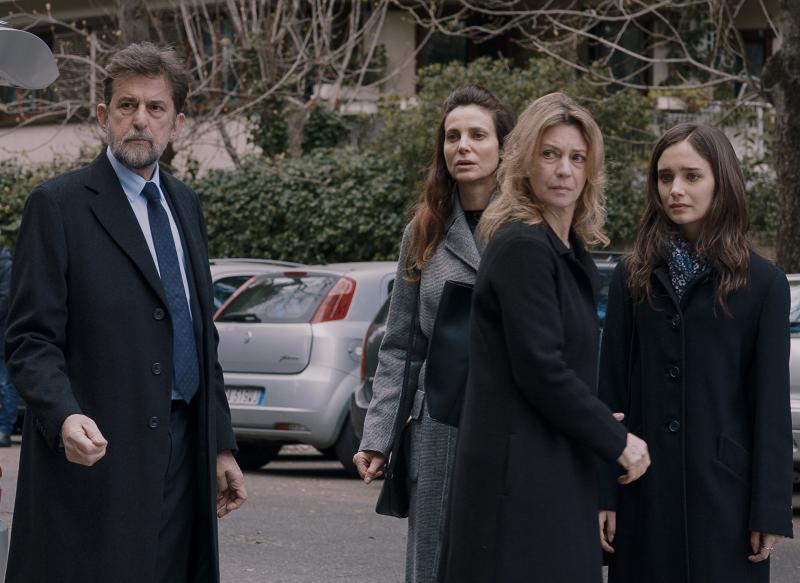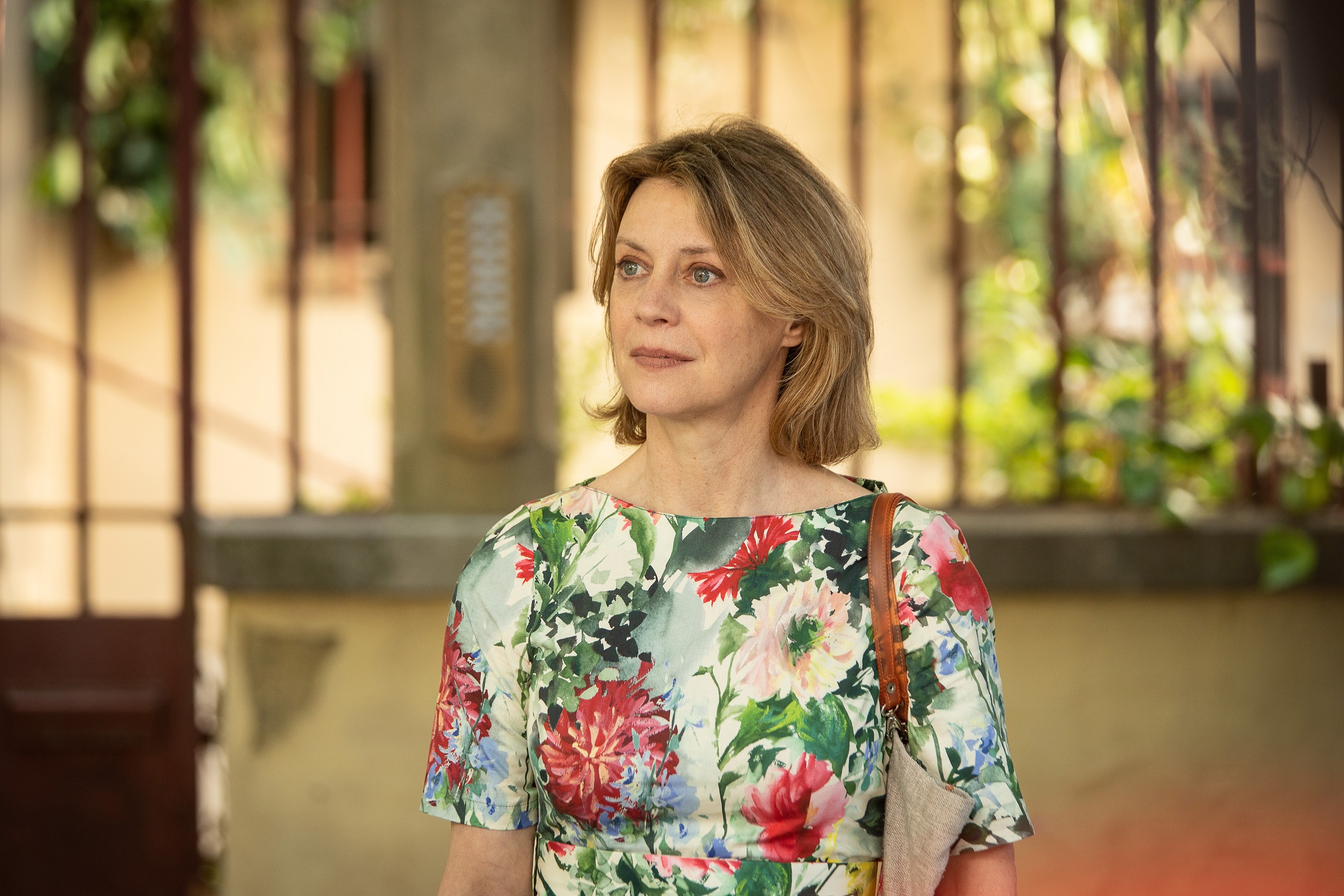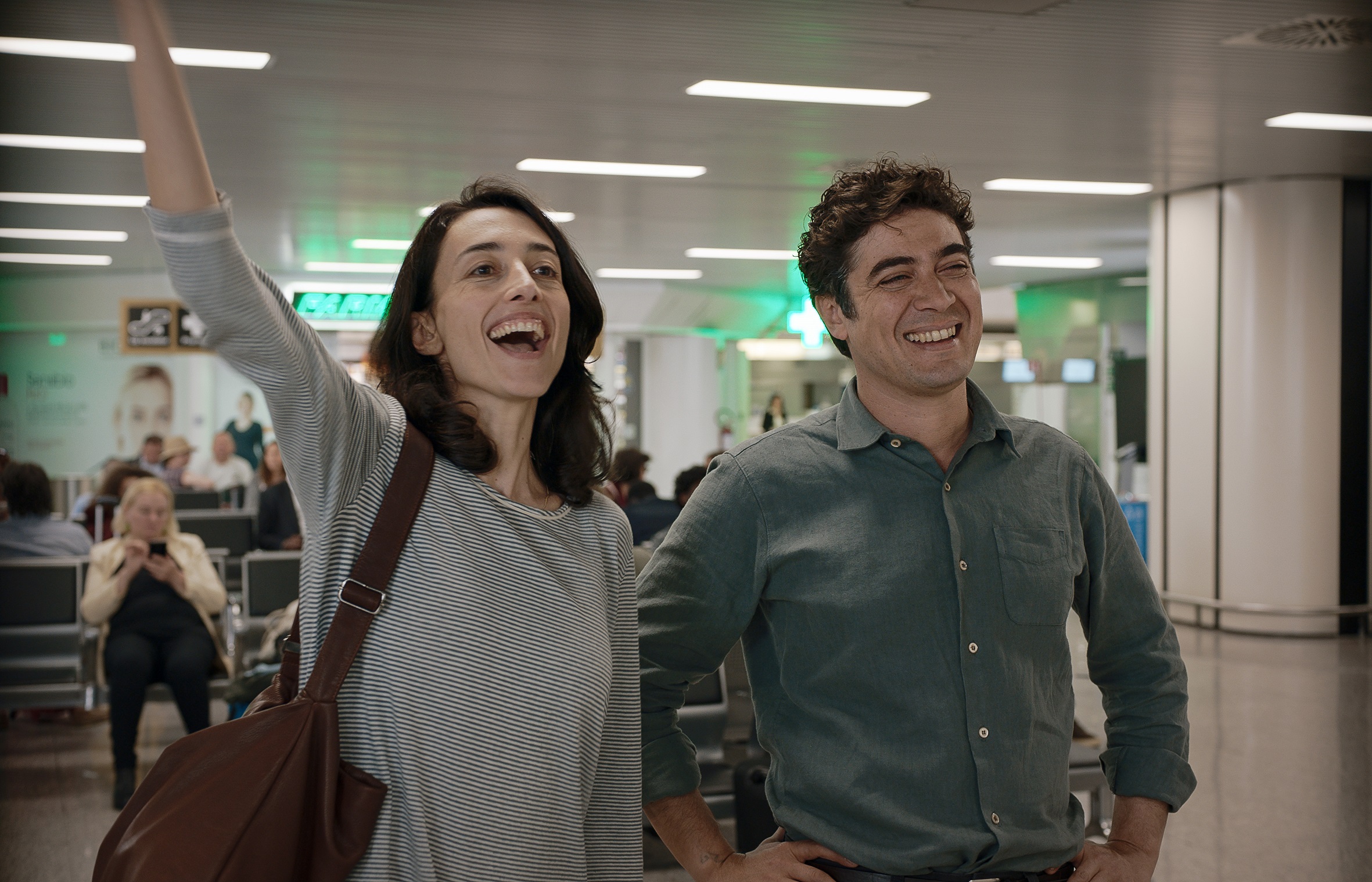Three Floors review - nothing like good neighbours | reviews, news & interviews
Three Floors review - nothing like good neighbours
Three Floors review - nothing like good neighbours
Italian families crack up after an accident, in Nanni Moretti’s drama

A speeding drunk driver arrows down a silent street into a Roman block of flats.
The teenage driver, Andrea (Alessandro Sperduti), sent a woman fatally careening on his disastrous course, confirming the low opinion of his judge dad (Moretti), while barely phasing sympathetic mum Dora (Margherita Buy). The smashed flat’s owners, Lucio (Riccardo Scamarcio) and Sara (Elena Lietti), are more concerned by incipiently senile old neighbour Renato, who they leave to babysit their young daughter, later found nestled with him in the park. Pregnant witness Monica (Alba Rohrwacher), whose husband is working abroad till the birth, stays in her lonely flat, subject to hallucinations. These lives intersect stubbornly and tragically in the crash’s aftermath. Moretti then returns at five-yearly intervals, observing foolishness, fear and circumstance inexorably eat his protagonists away, till letting some light in at last.
 Moretti is still best-known in Italy as the comically observational, middle-class everyman of early films such as Caro Diario (1994). But alongside political satires of varying sharpness – Il Caimano (2006) dared to tweak Berlusconi when he loomed over every aspect of Italian film finance – the Palme d’Or-winning The Son’s Room (2001) employed that everyman appeal in a study of shocking grief. Moretti’s stiffly moral judge here, more even than that film’s numb, seething dad, offers the husk of his old persona.
Moretti is still best-known in Italy as the comically observational, middle-class everyman of early films such as Caro Diario (1994). But alongside political satires of varying sharpness – Il Caimano (2006) dared to tweak Berlusconi when he loomed over every aspect of Italian film finance – the Palme d’Or-winning The Son’s Room (2001) employed that everyman appeal in a study of shocking grief. Moretti’s stiffly moral judge here, more even than that film’s numb, seething dad, offers the husk of his old persona.
Margherita Buy, pictured above, an earthily real, subtly nuanced everywoman and major Italian star, was previously showcased by Moretti as a long-suffering director with family issues in Mia Madre (2015). Here she gradually emerges from the moral fog of maternal love – supporting her selfish son with no regard to his victim – to become Three Floors’ heroine. Riccardo Scamarcio, pictured below with Lietti, whose capacity for charismatic danger was sealed in the gangster epic Romanzo Criminale (2008) and a cruder Hollywood job in John Wick: Chapter 2, suffers the most slow-burning self-destruction. When his daughter becomes withdrawn after being discovered with Renato, the suspicion she was abused consumes him. Renato’s teenage granddaughter Charlotte (Denise Tantucci) meanwhile makes a play for him which they both regret, his obsession and sexual weakness almost jailing him, the age aspect a bitter irony.
 Rohrwacher’s isolated Monica meanwhile comes unstuck, eventually befriending her husband’s despised estate agent brother, who’s defrauded their block. If, that is, she didn’t dream his transgressive, erotic attentions.
Rohrwacher’s isolated Monica meanwhile comes unstuck, eventually befriending her husband’s despised estate agent brother, who’s defrauded their block. If, that is, she didn’t dream his transgressive, erotic attentions.
Moretti says this film about neighbours as conflicted strangers has been made accidentally timely by Covid isolation. Transplanted from the novel’s Tel Aviv, it isn’t a particularly Italian microcosm, and threads more intimately convincing strands than everything-connects sagas such as 21 Grams. Moretti is a fundamentally decent, optimistic man, and he’s added a chapter to Nevo’s story, allowing his crisis-struck characters kinder, if chastened, resolutions. If this blunts Three Floors’ piercing sense of tragic flaws and fate, these people mostly deserve mercy, making his Hollywood-like softening hard to deny. The apartment block remains, an indifferent home to human foibles.
The future of Arts Journalism
You can stop theartsdesk.com closing!
We urgently need financing to survive. Our fundraising drive has thus far raised £49,000 but we need to reach £100,000 or we will be forced to close. Please contribute here: https://gofund.me/c3f6033d
And if you can forward this information to anyone who might assist, we’d be grateful.

Subscribe to theartsdesk.com
Thank you for continuing to read our work on theartsdesk.com. For unlimited access to every article in its entirety, including our archive of more than 15,000 pieces, we're asking for £5 per month or £40 per year. We feel it's a very good deal, and hope you do too.
To take a subscription now simply click here.
And if you're looking for that extra gift for a friend or family member, why not treat them to a theartsdesk.com gift subscription?
more Film
 Die My Love review - good lovin' gone bad
A magnetic Jennifer Lawrence dominates Lynne Ramsay's dark psychological drama
Die My Love review - good lovin' gone bad
A magnetic Jennifer Lawrence dominates Lynne Ramsay's dark psychological drama
 Bugonia review - Yorgos Lanthimos on aliens, bees and conspiracy theories
Emma Stone and Jesse Plemons excel in a marvellously deranged black comedy
Bugonia review - Yorgos Lanthimos on aliens, bees and conspiracy theories
Emma Stone and Jesse Plemons excel in a marvellously deranged black comedy
 theartsdesk Q&A: director Kelly Reichardt on 'The Mastermind' and reliving the 1970s
The independent filmmaker discusses her intimate heist movie
theartsdesk Q&A: director Kelly Reichardt on 'The Mastermind' and reliving the 1970s
The independent filmmaker discusses her intimate heist movie
 Blu-ray: Wendy and Lucy
Down-and-out in rural Oregon: Kelly Reichardt's third feature packs a huge punch
Blu-ray: Wendy and Lucy
Down-and-out in rural Oregon: Kelly Reichardt's third feature packs a huge punch
 The Mastermind review - another slim but nourishing slice of Americana from Kelly Reichardt
Josh O'Connor is perfect casting as a cocky middle-class American adrift in the 1970s
The Mastermind review - another slim but nourishing slice of Americana from Kelly Reichardt
Josh O'Connor is perfect casting as a cocky middle-class American adrift in the 1970s
 Springsteen: Deliver Me From Nowhere review - the story of the Boss who isn't boss of his own head
A brooding trip on the Bruce Springsteen highway of hard knocks
Springsteen: Deliver Me From Nowhere review - the story of the Boss who isn't boss of his own head
A brooding trip on the Bruce Springsteen highway of hard knocks
 The Perfect Neighbor, Netflix review - Florida found-footage documentary is a harrowing watch
Sundance winner chronicles a death that should have been prevented
The Perfect Neighbor, Netflix review - Florida found-footage documentary is a harrowing watch
Sundance winner chronicles a death that should have been prevented
 Blu-ray: Le Quai des Brumes
Love twinkles in the gloom of Marcel Carné’s fogbound French poetic realist classic
Blu-ray: Le Quai des Brumes
Love twinkles in the gloom of Marcel Carné’s fogbound French poetic realist classic
 Frankenstein review - the Prometheus of the charnel house
Guillermo del Toro is fitfully inspired, but often lost in long-held ambitions
Frankenstein review - the Prometheus of the charnel house
Guillermo del Toro is fitfully inspired, but often lost in long-held ambitions
 London Film Festival 2025 - a Korean masterclass in black comedy and a Camus classic effectively realised
New films from Park Chan-wook, Gianfranco Rosi, François Ozon, Ildikó Enyedi and more
London Film Festival 2025 - a Korean masterclass in black comedy and a Camus classic effectively realised
New films from Park Chan-wook, Gianfranco Rosi, François Ozon, Ildikó Enyedi and more
 After the Hunt review - muddled #MeToo provocation
Julia Roberts excels despite misfiring drama
After the Hunt review - muddled #MeToo provocation
Julia Roberts excels despite misfiring drama
 London Film Festival 2025 - Bradley Cooper channels John Bishop, the Boss goes to Nebraska, and a French pandemic
... not to mention Kristen Stewart's directing debut and a punchy prison drama
London Film Festival 2025 - Bradley Cooper channels John Bishop, the Boss goes to Nebraska, and a French pandemic
... not to mention Kristen Stewart's directing debut and a punchy prison drama

Add comment